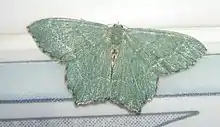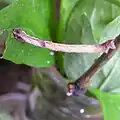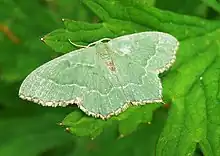Common emerald
The common emerald (Hemithea aestivaria) is a moth of the family Geometridae. The species is found throughout the Nearctic and Palearctic regions and the Near East. It is mostly commonly found in the southern half of the Ireland and Britain. It was accidentally introduced into southern British Columbia in 1973.[1][2]
| Common emerald | |
|---|---|
 | |
| Scientific classification | |
| Domain: | Eukaryota |
| Kingdom: | Animalia |
| Phylum: | Arthropoda |
| Class: | Insecta |
| Order: | Lepidoptera |
| Family: | Geometridae |
| Genus: | Hemithea |
| Species: | H. aestivaria |
| Binomial name | |
| Hemithea aestivaria (Hübner, 1799) | |
All wings are generally dark green with grey and white chequered fringes and narrow white fascia, two on the forewing, one on the hindwing. The green colouration tends not to fade over time as much as in other emeralds. The hindwings have a sharply angled termen giving the moth a very distinctive shape. The wingspan is 30–35 mm. It flies at dusk and night in June and July[3] and will come to light.
The larva is green with reddish-brown markings and black v-shaped marks along the back. The young larva will feed on most plants but later it feeds on trees and shrubs. The species overwinters as a larva.
- ^ The flight season refers to the British Isles. This may vary in other parts of the range.
Recorded food plants
- Aralia
- Artemisia
- Betula – birch
- Camellia
- Carpinus – hornbeam
- Castanea – chestnut
- Citrus
- Corylus – hazel
- Crataegus - hawthorn
- Diervilla – bush honeysuckle
- Hypericum – St John's wort
- Juglans – walnut
- Larix – larch
- Ligustrum – privet
- Malus – apple
- Morus – mulberry
- Photinia
- Prunus
- Quercus – oak
- Rhamnus – buckthorn
- Ribes – currant
- Rosa – rose
- Rubus
- Salix – willow
- Sorbus – rowan
- Tilia – lime
- Vaccinium
- Viburnum
Gallery
 Larva
Larva At rest
At rest.jpg.webp) Ventral view
Ventral view Museum specimen
Museum specimen
References
- Miktat, Doğanlar; Beirne, Bryan Patrick (October 1979). "Hemithea aestivaria, a geometrid new to North America, established in British Columbia (Lepidoptera: Geometridae)". The Canadian Entomologist. 111 (10): 1121. doi:10.4039/Ent1111121a-10.
- Schmidt, Christian; Anctil, Alexandre (21 May 2021). "Hemithea aestivaria (Hübner) (Lepidoptera: Geometridae), a Palaearctic moth, new to eastern North America". Biodiversity Data Journal. 9. doi:10.3897/BDJ.9.e64985.
- Powell, J. A. and P.A. Opler. (2009). Moths of Western North America. Berkeley: University of California Press
- Chinery, Michael Collins Guide to the Insects of Britain and Western Europe 1986 (Reprinted 1991)
- Skinner, Bernard Colour Identification Guide to Moths of the British Isles 1984
External links
- Common emerald UKMoths
- Savela, Markku. "Hemithea aestivaria (Hübner, 1789)". Lepidoptera and Some Other Life Forms. Retrieved November 30, 2018.
- "07980 Hemithea aestivaria (Hübner, 1789) - Gebüsch-Grünspanner". Lepiforum e.V. Retrieved November 30, 2018.